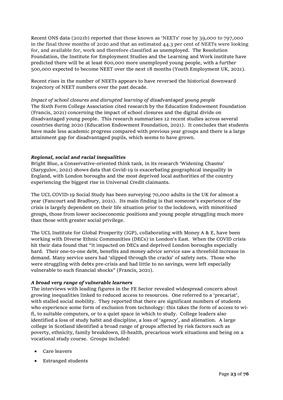
Page 23 of 76
Recent ONS data (2021b) reported that those known as 'NEETs' rose by 39,000 to 797,000
in the final three months of 2020 and that an estimated 44.3 per cent of NEETs were looking
for, and available for, work and therefore classified as unemployed. The Resolution
Foundation, the Institute for Employment Studies and the Learning and Work institute have
predicted there will be at least 600,000 more unemployed young people, with a further
500,000 expected to become NEET over the next 18 months (Youth Employment UK, 2021).
Recent rises in the number of NEETs appears to have reversed the historical downward
trajectory of NEET numbers over the past decade.
Impact of school closures and disrupted learning of disadvantaged young people
The Sixth Form College Association cited research by the Education Endowment Foundation
(Francis, 2021) concerning the impact of school closures and the digital divide on
disadvantaged young people. This research summarises 12 recent studies across several
countries during 2020 (Education Endowment Foundation, 2021). It concludes that students
have made less academic progress compared with previous year groups and there is a large
attainment gap for disadvantaged pupils, which seems to have grown.
Regional, social and racial inequalities
Bright Blue, a Conservative-oriented think tank, in its research 'Widening Chasms'
(Sarygulov, 2021) shows data that Covid-19 is exacerbating geographical inequality in
England, with London boroughs and the most deprived local authorities of the country
experiencing the biggest rise in Universal Credit claimants.
The UCL COVID-19 Social Study has been surveying 70,000 adults in the UK for almost a
year (Fancourt and Bradbury, 2021). Its main finding is that someone's experience of the
crisis is largely dependent on their life situation prior to the lockdown, with minoritised
groups, those from lower socioeconomic positions and young people struggling much more
than those with greater social privilege.
The UCL Institute for Global Prosperity (IGP), collaborating with Money A & E, have been
working with Diverse Ethnic Communities (DECs) in London's East. When the COVID crisis
hit their data found that "it impacted on DECs and deprived London boroughs especially
hard. Their one-to-one debt, benefits and money advice service saw a threefold increase in
demand. Many service users had 'slipped through the cracks' of safety nets. Those who
were struggling with debts pre-crisis and had little to no savings, were left especially
vulnerable to such financial shocks" (Francis, 2021).
A broad very range of vulnerable learners
The interviews with leading figures in the FE Sector revealed widespread concern about
growing inequalities linked to reduced access to resources. One referred to a 'precariat',
with stalled social mobility. They reported that there are significant numbers of students
who experience some form of exclusion from technology: this takes the form of access to wifi, to
suitable computers, or to a quiet space in which to study. College leaders also
identified a loss of study habit and discipline, a loss of 'agency', and alienation. A large
college in Scotland identified a broad range of groups affected by risk factors such as
poverty, ethnicity, family breakdown, ill-health, precarious work situations and being on a
vocational study course. Groups included:
• Care leavers
• Estranged students